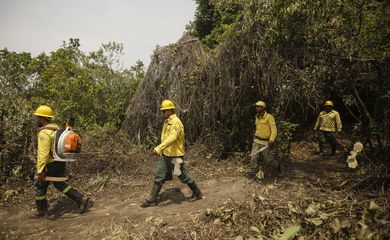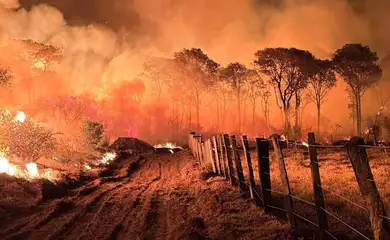New state law protects pantanal biome in Mato Grosso do Sul

The governor of Mato Grosso do Sul, Eduardo Riedel, has sanctioned the Pantanal Law, aimed at promoting the conservation, protection, restoration, and sustainable exploitation of the biome in the state.

The state law, effective this week, was drafted in partnership with the Ministry of the Environment and Climate Change. Among other things, it outlines rules for agriculture and establishes a fund for environmental services.
The piece of legislation recognizes the state’s pantanal areas as a priority for compensation and conservation. It also stipulates that rural properties must preserve half of the area with forest and cerrado formations. In places covered by grassland, the percentage is reduced to 40 percent.
Authorization to remove native vegetation will depend on registration and approval by the Rural Environmental Registry, as well as the absence of environmental infractions in the last three years, and an approved environmental impact report for areas of over 500 hectares, among other conditions.
Exotic crops, like soybeans and sugar cane, are banned, except for subsistence and non-commercial purposes. Existing ones cannot be expanded.
At the signing ceremony, Brazil’s Minister for the Environment and Climate Change Marina Silva said the law should facilitate the preservation of the pantanal and cerrado biomes, helping sustainable development.
“We can be a water power, an agricultural power, a forestry power, all at the same time, generating jobs and income,” said the minister. “We are opening a gateway for Brazil to be economically prosperous and socially just—and also environmentally sustainable,” she added.
The legislation also prohibits the confinement of cattle, except on existing farms and in exceptional circumstances during periods of flooding or environmental emergency.
As long as preservation is not harmed, extensive grazing may be authorized in reserves, protected river areas, salt evaporation ponds, and bays.
“New charcoal projects will also not be authorized, as well as the construction of dikes, drains, dams, and other alterations to the hydrological system, in addition to small hydroelectric plants. There will be bans on exotic species of fauna,” the ministry stated.
The law also stipulates the creation of the Pantanal Climate Fund, for environmental services. Priority will be given to the protection and recovery of springs and the vegetation in degraded areas that are strategic for the formation of ecological corridors.
The resources should stem from environmental fines paid to the state, among other sources, adding up to an estimated BRL 50 million by 2024.
“We may be setting an example by contributing not only to Mato Grosso do Sul, but to the entire planet, because this biome is unique,” said Riedel. “Science has guided all our discussions. Several researchers have been involved. When in doubt, we’ll turn to science,” the governor declared.
Before the sanction
One of Brazil’s six biomes, the pantanal extends into the neighboring state of Mato Grosso. From 2016 to 2022, deforestation in the Mato Grosso do Sul pantanal amounted to 3,517 km², up 25.4 percent from the 2,622 km² recorded for 2009–2015, as per data from the National Institute for Space Research (Inpe).
In a technical note, the Environment Ministry found that the criteria previously adopted by the state to authorize the suppression of native vegetation were not in accordance with Article 10 of the Brazilian Forest Code. The note recommended the regulation of the article and the conservation and sustainable use of the pantanal, as well as measures to suspend the effects of the state rules.
In August, the governor suspended licenses and permits for cutting down vegetation in the region and sought a joint solution with the ministry. A working group was set up with ministry officials and the state government to draft the Pantanal Law, which was presented to the Legislative Assembly and approved one week before the governor’s sanction by 23 votes to one.



